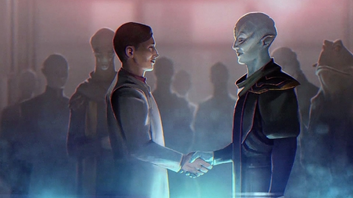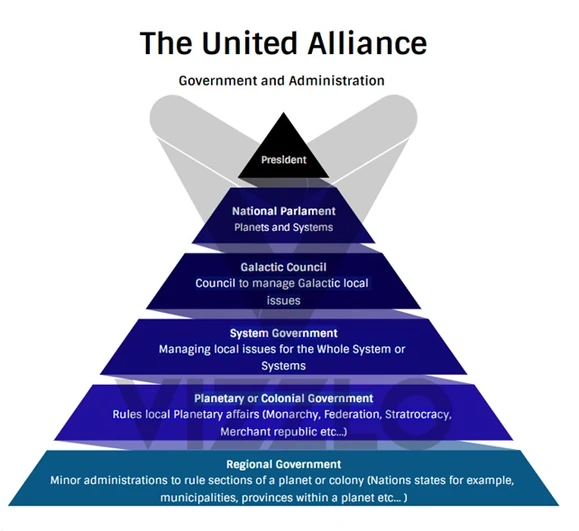"Born out of the revolution of few miners, several intelligent species came together to fight against oppression. The Alliance is currently, and has always been, a free haven for all intelligent life in the Herschel Space. Here, they live in peace and harmony. Free will and laissez-faire for all worlds, united by the common ideals of freedom and equality under a single macro-government to protect them all." - Lisa Martinez, Explorer & Scientists
The United Alliance, sometimes called the Alliance and abbreviated as T.U.A. or U.A., is a human-born nation originating in the Lewis Galaxy and thus known as one of the Lewis Nations. The Capital of the Nation is Located in the Planet Kreon, an ecumenopolis with several human and Alien species living together on the planet.
This nation is made of the union of several planets and systems to form a cohesive democratic institution. Each planet is somehow free to organise itself in the matter that they please but have to send representatives to the Parliament of the Alliance responsible for ruling internal affairs, international affairs, economy, trading, military and security as well as other issues. Its government could be said to be between a Federation and a Confederacy..
The Alliance was created when colonist from the back then known as Lewis Federation (the Current Intergalactic Federation) started to settled on the Jord Nebulae, a rich mineral area, far from the Human nation's core and on the border of Federal territory. Not far also lie several Alien Nations. The Nebulae was hard to reach and colonist were pretty much isolated from their home nation.
Soon, changes on taxes and on mineral products and other basic resources for the regional colonies started a revolution between the planets of the area and their Nation. Many Xeno and Human planets in the Region revolted and soon, had to reach an alliance between themselves to create a military force capable of defending them. A small army of the Federation came to put end on the revolt, but they couldn't get well through the Nebulae Since they didn't knew the local area as well as the inhabitants, and they were easily assaulted and defeated.
Other fleets arrived but the recently created Alliance had total control and knowledge of the region while the national forces didnt, what ended on massives defeats for the Federation. Soon, it had to acknowledge the Independence of the Planets in this Nebulae.
One of the Most populated world are Kreon, Boreas, Tirk, Galora, Mosshir, Uinur, Plegaria, Fildias, Eredis, Yaul, Solotun, Aikyam, Hebena and Neikoor.
History[]
The foundation of the United Alliance starts with the arrival of settlers from the Federation Worlds into the Jord Nebulae. The area was rich in minerals and other valuable resources, so the Federation had interest in colonizing it, and soon financed the colonization of the Nebulae.
Many of the Planets were sparsely populated and due to its distance from the core, the areas was a hub for some piracy and smuggling activities. The Federation Law was unable to act properly and soon, the local authorities had to operate in a self autonomy state and the region adopted its own distinct dialect and culture.
In 47,497 CE, the Federation rose taxes and manipulated prices for mining resources to increase its revenue, which hit harly on the Jord Nebulae, making the exports of the region (the main source of income) less competitive and available to buyers. This strike riots and revolts on the region, with higher degrees of criminal activity. This differences on interests grew to more tensions between the planets of the region and the Federation. This led to the unilateral declaration of Independence on 47 520 CE.

All the Planets signed a Cooperation and Alliance agreement, out of the hate for the Federation. Still, this declaration of independence was not recognize by the Federation or other nations in the Galaxy and beyond. The Federation tried to bring the Alliance back into the nation, leading a navy into the Jord Nebulae. The navy had little knowledge of the region, while the local people new the area pretty well. This proved to be an advantage and the smaller Alliance fleet was able to defeat the Federation.
Soon, other Federation fleets followed with same disastrous results. The Planets of the Nebulae which had valuable resources were lost for the Federation. This planets also refused to give aid to Federal armies and navies, even assaulting and attacking them from the surface. The Guerrilla and firm opposition from the local population to the Federation, made it an area imposible to handle. This force the Federation to acknowledge their defeat. Peace was signed in Kreon, and the new nation was recognised by the Federation. The Official declaration of Independence and birth of the Nation was signed in 102,565 CE.
Shortly, the nation was named "The Alliance of Mining Worlds", but very soon, when expansion outside the nebulae started, the name was changed into The United Alliance. Each planet had its own independence and own local government body, with a national joint policy, that has become more federal by the years.
The Alliance defended the interest of the independent planets without absorbing them in a single language or culture or imposing them some local laws. The Alliance only rules above some aspects, like immigration (internal and external), the economy and taxes, the civil rights rule etc... with each member having negotiation power on its own with the government and the other nations (although supervised by the Alliance upper government), as it has the opportunity to split from the Alliance if it wishes so. Although this has happened just one, with the formation of the Republic of Sion.
Society[]

The Population of the United Alliance is very diverse in every form posible. The population is made up of Humans, that make up the majority of the population but also other Alien species that make up to a third of the inhabitants of the nation. Many languages, religions and cultures can be seen alongside each world in the Alliance.
The Kreonese language, is the standard working language for the United Alliance and is used as a lingua franca between planets with different tongues. Nevertheless, this language is the most natively spoken, especially in many human worlds, as it has gradually supplanted some local minor languages. Kreonese is mostly spoken in those Planets founded by colonist from Kreon, and in those planets settled in other Galaxies, while the Jord and Germinis Nebulas have many distinct languages due to the founding of Jord Nebula planets and the isolation of the Germinis Nebula with many Alien worlds. The Germinis Nebula was subject to the birth of the Republic of Sion.
Aliens species that live within the borders of the United Alliance are the Koor, the Krizik, the Arati, the Aldorians, the Noraki and the Murban, among others. The most diverse world is Kreon, the capital, in which just 35% of its population is human (still being by far the largest species in the planet).
Other Languages spoken in the United Alliance are the other human languages of the Lewis Galaxy (The Imperial language, the Federal language and the Unionist language), the Aldorian languages (Uhara, Margak, Inosh, Palnir and Teremir), the Krizik languages (Zikar, Vazik, Uikik, Mekik and Zak), the Arati languages (Aras, Neren, Irta and Run), the Noraki language and the Murban language.
The Federal language, the Imperial language, the Unionist language, Margak, Inosh, Zikar, Vazik, Murbani and Aras, are the most spoken language in the nation after Kreonese.
Government[]
The Government is organized in a Parlament, similar to that in the Federation. However, each Planet and system is free to organized themselves in the matter that they please. So very often, planets have subgovernments that rule them. Nevertheless, the United Alliance Federal Law is above any local law. One of the curiosities of this system is that each planet has its own set of laws, so things may be forbidden in one world but allowed in another within the Alliance.
Heavily populated Systems may have one or several planets with its own representation in the parlament. On the other hand, planets and systems on the frontier or sparsely populated may be grouped together to form one single representation in the Parlament. Every planet with a population above 10 Billion can apply for its own representation, unless is the only populated world in a see of low density populated systems. In such case, they are forced to act as a center of power for those systems and thus cannot split up from them.
The President[]
Elected candidates come from the Parlament and from them, the voting is assigned all across the United Territory. However, the systems from which the President comes from are not allowed to vote for his local candidate in the election. Candidates are rotated from systems and planets to avoid presidents always coming from the most populated worlds.
The Parlament[]
The Parlament has currently several hundreds of representatives. It's representatives are grouped together by System or Planet and they make a numerous amount of members. They are in charge of voting for common laws and regulations. Each member of the Parlament is represented regardless of population size.
The Galactic Councils[]
This government boddies are local to each Galaxies were the United Alliance has a presence on. Each galaxy has its own chamber to decide on local matters on its own galactic territory. They are minor to the Parlament and the President but do have some regulation power within their own region. They represent, usually based on population, each and every species in the U.A galactic territory having at least a population of 10 million. This can vary depending on the United Citizen population in a Galaxy overall).
System Government[]
Each populated system with more than 100 million inhabitants has the power to constitute a system government. However, systems with a lower population that that are grouped with the closest inhabited system to reach the minimum population required. Once achieved they can set their system government. They can in the future get their own if their local population increases enough. The system has at least one representative for each settlement and settlements with more than 1 Billion have the option to send 2 parlaments increasing their representation for each billion.
As an Example: A System with 9.4 Billion inhabitants, out of which 5 Billion live in X planet and the others scatted in 1 colony with 2 billion, 2 other colonies with 1 billion each and 4 colonies with 100 million each in the sytem. Their representation would be as follow: 5 representatives for the X Planet, 2 representatives for the colony with 2 billion, 1 representative for each colony in the system with 1 billion (with the option of sending a second once they surpass the 1 billion mark), and 1 representative for each of the colonies with 100 million, with a total representatives of 13 for this system.
Planetary or Colonial Government[]
Each settlement has the option to have the form of ruling that they please. This mean that one colony in a system can be organized as a federation while another a Constitutional Monarchy and another a Merchant Republic. This leaves freedom of choice on how they locally want to be ruled and respecting traditional forms of government. Most notably for Xeno forms of life. This government rules administrative and planetary affairs on a global scale. All settlements or colonies no matter sizes require a form of government. They have little to no power in National affairs but do have a say in choosing the system representatives or even the Galactic Council.
Regional Government[]
Most of this governments do rule within a colony. Some small settlements or colonies do not have regional governments. This mostly apply to Planets or well populated colonies with at least a 100 million people. Regional goverments are small subdivisions within a Planet, operating in the form of Provinces or nation states. They have power to elect or choose the Planetary Government. They operate and manage day to day affairs in the area they control.

